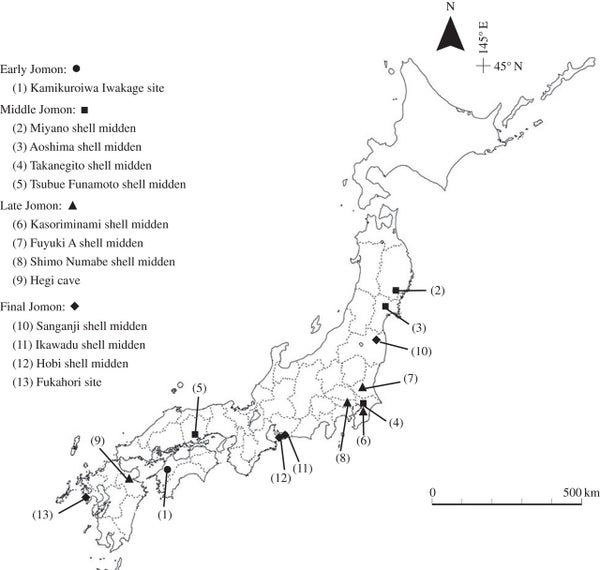This article was published in Scientific American’s former blog network and reflects the views of the author, not necessarily those of Scientific American
The evidence against the deep-roots theory of war keeps mounting. The theory holds that war’s roots extend back hundreds of thousands or even millions of years, and that war is an adaptive trait, favored by natural selection.
The theory has been promulgated by many influential scholars, including psychologist Steven Pinker, biologist Edward Wilson and anthropologist Richard Wrangham.
For a recent example of the theory in action, see this Washington Post essay by Wrangham’s colleague Luke Glowacki. The violence of the Islamic State, he contends, is just the latest manifestation of a primal propensity that we share with chimpanzees, our closest relatives. “Although there are well-documented cases of hunter-gatherers living peacefully with their neighbors,” Glowacki states, “these are the exception rather than the rule.”
On supporting science journalism
If you're enjoying this article, consider supporting our award-winning journalism by subscribing. By purchasing a subscription you are helping to ensure the future of impactful stories about the discoveries and ideas shaping our world today.
Actually, the reverse is true. As I keep reminding readers (see Further Reading), the evidence is overwhelming that war is a relatively recent cultural invention. War emerged toward the end of the Paleolithic era, and then only sporadically. A new study by Japanese researchers published in the Royal Society journal Biology Letters corroborates this view.
Six Japanese scholars led by Hisashi Nakao examined the remains of 2,582 hunter-gatherers who lived 12,000 to 2,800 years ago, during Japan’s so-called Jomon Period. The researchers found bashed-in skulls and other marks consistent with violent death on 23 skeletons, for a mortality rate of 0.89 percent.
Even this estimate for warfare-mortality might be high, the researchers note, “because some injuries were likely due to homicide or accident rather than warfare.” Remarkably, the team found no signs of violence on skeletons from the so-called Initial Jomon Period, which lasted from 12,000 to 7,000 years ago.
The mortality rate estimated by the Japanese team is more than an order of magnitude lower than rates commonly cited by deep-rooters, and it corroborates a study of early human remains carried out by Jonathan Haas and Matthew Piscitelli.
“We argue that warfare was probably not common among hunter–gatherers of the Jomon period,” Nakao and his colleagues state. They add that their study contradicts the claim “that warfare is inherent in human nature and was an important selective pressure.”
The media, following the old dictum “If it bleeds, it leads,” love the deep-roots theory. See for example the recent coverage of a massacre that apparently took place near Africa’s Lake Turkana 10,000 years ago, which was widely--and wrongly—viewed as evidence for the deep-roots theory.
The new Japanese study, fortunately, has also attracted media attention. “The results suggest perhaps that violence is not so inherently part of human nature as has been previously proposed,” notes The Daily Mail, a British paper. (See also reports in The Washington Post, International Business Times and United Press International.)
The debate over the deep-roots theory matters, because many people think that if war is ancient and innate, it must also be inevitable. President Barack Obama implied as much when he stated in 2009 that war “appeared with the first man” and “we will not eradicate violent conflict in our lifetimes.”
This sort of fatalism could undermine efforts to achieve permanent peace. I hope the Japanese study portends the beginning of the end of the flimsy yet insidious deep-roots theory of war.
Addendum: Anthropologist Jonathan Haas, whose work I cite above, sent me the following comment: It is sad that we have to continue to confront the pernicious argument of the “deep roots” of warfare in humanity. There is absolutely no scientific evidence in either biology or archaeology (the only two disciplines that really count in this debate) for human warfare going back more than 10,000 years. Biological accounts of chimpanzee “warfare” demonstrate that chimpanzees engage in intergroup conflict--under conditions that are remarkably similar to those affecting certain relatively recent human societies. This is simply not evidence for the biological foundations of human warfare, any more than using a sponge (or crumpled leaves) to soak up water is part of the biological makeup of humanity. As to the archaeological record, for 190,000 years of human existence, there is simply no evidence of warfare in the human repertoire. The supposed “evidence” cited by scholars such as Pinker, Bowles and others consists of an unscientific mishmash of data drawn from the relatively recent prehistoric past by people who know nothing about the science of archaeology. The truly dangerous part of the “deep roots” theory is that provides a foundation for warmongers to ignore the actual root causes of war in the modern world, which are invariably to be found in the material bases of culture--environment, resource availability, demography and production. If we are going to understand why people go to war, we have to understand that warfare comes not from our biology but from causal variables that can be addressed and resolved by human actions.
Further Reading:
10,000-Year-Old Massacre Does Not Bolster Claim That War Is Innate.
I am Innately Aggressive, Not Innately Warlike.
New Study of Foragers Undermines Claim That War Has Deep Evolutionary Roots.
New Study of Prehistoric Skeletons Undermines Claim that War Has Deep Evolutionary Roots.
Survey of Earliest Human Settlements Undermines Claim That War Has Deep Evolutionary Roots.
Chimp Violence Fails to Support Deep-Roots Theory of War.
Margaret Mead’s War Theory Kicks Butt of Neo-Darwinian and Malthusian Models.
RIP Military Historian John Keegan, Who Saw War As Product of Culture Rather than Biology.
